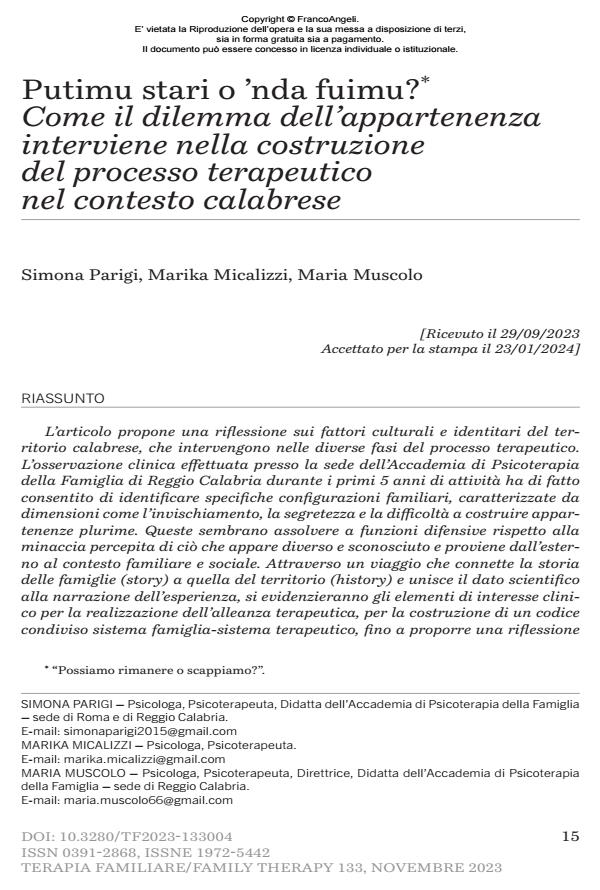Putimu stari o ’nda fuimu? Come il dilemma dell’appartenenza interviene nella costruzione del processo terapeutico nel contesto calabrese
Titolo Rivista TERAPIA FAMILIARE
Autori/Curatori Simona Parigi, Marika Micalizzi, Maria Muscolo
Anno di pubblicazione 2024 Fascicolo 2023/133
Lingua Italiano Numero pagine 15 P. 15-29 Dimensione file 676 KB
DOI 10.3280/TF2023-133004
Il DOI è il codice a barre della proprietà intellettuale: per saperne di più
clicca qui
Qui sotto puoi vedere in anteprima la prima pagina di questo articolo.
Se questo articolo ti interessa, lo puoi acquistare (e scaricare in formato pdf) seguendo le facili indicazioni per acquistare il download credit. Acquista Download Credits per scaricare questo Articolo in formato PDF

FrancoAngeli è membro della Publishers International Linking Association, Inc (PILA), associazione indipendente e non profit per facilitare (attraverso i servizi tecnologici implementati da CrossRef.org) l’accesso degli studiosi ai contenuti digitali nelle pubblicazioni professionali e scientifiche.
L’articolo propone una riflessione sui fattori culturali e identitari del territorio calabrese, che intervengono nelle diverse fasi del processo terapeutico. L’osservazione clinica effettuata presso la sede dell’Accademia di Psicoterapia della Famiglia di Reggio Calabria durante i primi 5 anni di attività ha di fatto consentito di identificare specifiche configurazioni familiari, caratterizzate da dimensioni come l’invischiamento, la segretezza e la difficoltà a costruire appartenenze plurime. Queste sembrano assolvere a funzioni difensive rispetto alla minaccia percepita di ciò che appare diverso e sconosciuto e proviene dall’esterno al contesto familiare e sociale. Attraverso un viaggio che connette la storia delle famiglie (story) a quella del territorio (history) e unisce il dato scientifico alla narrazione dell’esperienza, si evidenzieranno gli elementi di interesse clinico per la realizzazione dell’alleanza terapeutica, per la costruzione di un codice condiviso sistema famiglia-sistema terapeutico, fino a proporre una riflessione sui fattori protettivi che contribuiscono alla riduzione del dropout e alla possibilità di co-costruire una differenziazione pensabile ed evolutiva garante di una appartenenza possibile.
Parole chiave:mito, differenziazione, psicoterapia familiare, Calabria, multigenerazionale, appartenenza.
Simona Parigi, Marika Micalizzi, Maria Muscolo, Putimu stari o ’nda fuimu? Come il dilemma dell’appartenenza interviene nella costruzione del processo terapeutico nel contesto calabrese in "TERAPIA FAMILIARE" 133/2023, pp 15-29, DOI: 10.3280/TF2023-133004